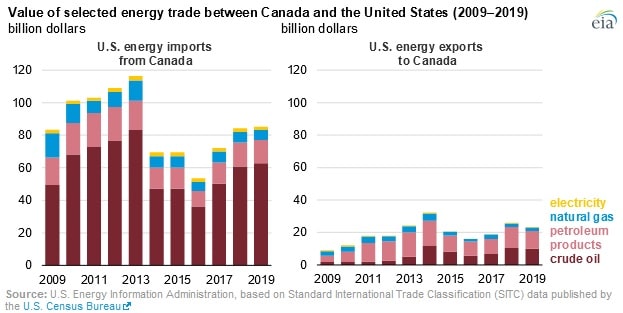Energy Accounted for $85 Billion of U.S. Imports From Canada in 2019: EIA

Canada is the second-biggest destination for U.S. energy exports, next only to Mexico, and the main source of U.S. energy imports, according to a June 5 report from the U.S. Energy Information Administration. In 2019, energy accounted for $85 billion, or 27 percent, of the trade value for U.S. imports from Canada; crude oil and petroleum accounted for 91 percent of the value of imports from Canada and 89 percent of the exports to the country.
- Crude oil, petroleum products, natural gas, and electricity totaled $23 billion, representing 8 percent of the value of U.S. exports to Canada in 2019, the second-highest level recorded after the peak registered in 2014.
- Crude oil imports from Canada, which are usually heavy grades from the oil sands in Alberta and tend to flow to the Midwest Refineries, grew from 3.7 million barrels per day in 2018, to 3.8 million barrels per day in 2019, accounting for 56 percent of all crude oil imports to the U.S.
- Canada’s growing crude oil production and insufficient pipeline capacity led to a growth of trade by rail, with U.S. imports by rail more than tripling from 2016-2019 an average of 300,000 barrels per day, and more than half of the volume destined to the U.S. Gulf Coast region.
- Petroleum product trade between the two nations are relatively balanced in both volume and value, despite the fact that Canada is the main source for U.S. imports.
- Last year, the U.S. imported a record 610,000 barrels per day, valued at $14 billion, of petroleum products from Canada, which account for 26 percent of all U.S. petroleum product imports.
- Historically, U.S. imports by pipeline from Canada have exceeded exports with natural gas trade by pipeline accounting for 98 percent of all U.S. natural gas imports in 2019.
Electricity accounts for a small but important portion of the energy trade between the U.S. and Canada as they share more than 30 major cross-border electric transmission lines; the U.S. imported 52 million megawatthours of electricity and exported 14 million megawatthours to Canada in 2019.
EnerKnol Pulses like this one are powered by the EnerKnol Platform—the first comprehensive database for real-time energy policy tracking. Sign up for a free trial below for access to key regulatory data and deep industry insights across the energy spectrum.
ACCESS FREE TRIAL